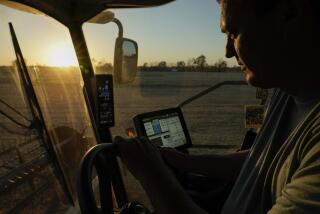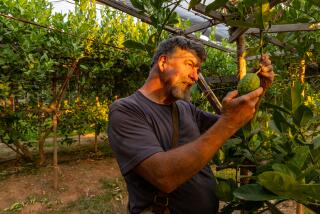Amish Have Extra Help in Weathering the Drought
- Share via
MOUNT HOPE, Ohio — Amish farmer Elam Swartzentruber believes he has something better than electricity and technology to help him through the worst drought in more than 50 years: faith and brotherhood.
Swartzentruber, better known by his Amish neighbors as “Elam E.,” is one of about 30,000 Amish residents in Ohio, 15,000 of them involved in farming.
The Amish, a Protestant group formed in a split with the Mennonites in 17th-Century Switzerland, believe in simplicity. They dress plainly, are forbidden to have electricity in their homes and do not use motorized equipment on their farms.
It is that difference from the way “the English” work the land that has protected the Amish and Mennonites from financial ruin during the drought that is plaguing the Midwest. The Mennonites also follow simple ways, but are permitted to use some modern technology.
Amish and Mennonite farmers in eastern Ohio say they have lost about half of this year’s hay crop and have seen a marked decrease in the quality and size of their oat and corn crops.
But Swartzentruber, 52, of Millersburg in Holmes County, said he expects no long-term financial problems because he does not have the debt other farmers must repay. And he said he always pays cash for grain and seed.
“I don’t talk too good, but I farm good,” Swartzentruber said in his thick German accent. “This is the worst I’ve seen it ever, but I think it won’t get any worse.”
He said the drought has not hurt his dairy cattle or feeder hogs and he expects to make a profit selling milk. But next year’s feed prices likely will rise, making it tougher to make ends meet.
Have Money Put Away
“The Amish have been hurt by the drought, but not as much as you would think,” said Lloyd Miller, a local expert on the people and their customs.
Miller left the Amish years ago but is considered a close friend and liaison by the Amish and Mennonites.
They often do things in addition to farming, such as woodworking, and because they are so thrifty they have money put away for emergencies, Miller said.
“They may look poor, but that does not necessarily mean they are,” he said.
Jonas Miller, a Mennonite who farms 100 acres near Fredericksburg, also is an auctioneer at the weekly Mount Hope farm supply sale, raises registered European Haflinger horses and sells deer hides.
He said he attended a recent auction that did not end until 10 hours later than normal.
“People, including the Amish and Mennonites, were panicking, selling everything that doesn’t make them money,” Jonas Miller said. “But not me. My father always told me ‘When everybody runs, just walk.’
“I was lucky. I bought a lot of hay in April. It wasn’t foresight. It was just luck. But you can be sure I’m hanging on to it.”
Jonas Miller, who is not related to Lloyd Miller, grows corn, hay and oats and raises dairy cows and hogs. He said only half of his oats and hay crops have come in. He does not hold much hope for his corn.
Crops Reduced
“I will lose a lot of money, but I--as we all do--have tried to operate as sharply as I could,” said the 52-year-old farmer.
Abraham Yoder, an Amish farmer who works 95 acres near Mount Hope with his five young sons, said the situation there is not as bad as he first thought.
“At first it looked like we weren’t getting any corn, now it is looking like we’re going to get half a crop,” he said.
He said his second hay cutting, which normally yields 3,500 bales, this year produced 2,600. His milk production is down as is his profit from the sale of pigs.
The three farmers all said the drought will not take too large a toll on the community because they take care of each other.
An Amish farmer lost his barn two weeks ago when it was hit by lightning, but Jonas Miller said area Mennonite and Amish farmers were organizing a barn-raising that would not end until the barn is reconstructed.
More to Read
Sign up for Essential California
The most important California stories and recommendations in your inbox every morning.
You may occasionally receive promotional content from the Los Angeles Times.










